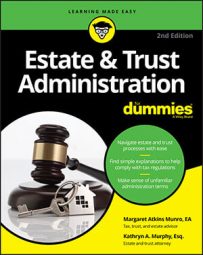If your decedent’s probate estate (assets in his or her name alone, payable to the estate, or held jointly for convenience only) is of limited size, it may qualify for one of several small estate procedures, whether or not your decedent left a will. These streamlined procedures can save you time and the estate money.
Small estate administration can be quick and reasonably painless if you’re eligible to use it and using it makes sense. It might seem like a marathon, running from attorney to court to family members for signatures and back to court, but it may only take one day. By comparison, if traditional probate is required, the entire probate process might take more than a year to complete.
Small estate procedures with some allowances taken into account
Just about every state has some form of small estate procedure. Some of the typical small-estate procedures that may be available in your state (check with your local probate court) include the following (and don’t be afraid to try to use more than one if it means that you can avoid a more lengthy probate procedure):
Wages and fringe benefits: Under this type of statute, if the only assets of the estate are wages and fringe benefits from the decedent’s employer, those assets are paid over to certain people as set out in the statute; for instance, the surviving spouse, children, parents, and so on, in that order, without the necessity of probate.
Automobile: Just about every state has a statute providing for the transfer of the decedent’s automobile to the heirs if there are no other assets subject to probate and the car doesn’t exceed a certain value (currently $60,000 in Michigan).
Cash and wearing apparel: In Michigan, a hospital, convalescent or nursing home, morgue, or law enforcement agency holding $500 or less and wearing apparel can deliver the same to the decedent’s spouse, child, or parent. Check your state for a similar statute.
Dollar amount small estate procedures in probate court or by affidavit: Most states have provisions for small estate procedures. The dollar amounts that qualify vary by state, but in every case, the procedure is vastly shorter and more simplified than for larger estates. For instance, in Michigan, if the decedent’s gross estate after payment of funeral and burial expenses is $21,000 or less in 2012 (indexed for future years):
In probate court: The court may order that it be turned over to the surviving spouse, or, if none, to the decedent’s heirs as defined by statute. To accomplish this, a Petition and Order for Assignment is filed with the probate court.
By affidavit: If there is no real estate in the probate estate, an affidavit procedure (used in a number of states) may be used instead.
Under the affidavit procedure in Michigan, beginning 28 days after the decedent’s death, a person possessing the decedent’s property must deliver that property to a person claiming to be the decedent’s successor upon being presented with a death certificate and an Affidavit of Decedent’s Successor for Delivery of Certain Assets Owned by Decedent. The recipient of the property is subject to certain limitations and liabilities.
Small estate procedures with all allowances taken into account (summary administration)
Under this type of procedure, the personal representative, without giving notice to creditors, may immediately disburse and distribute the estate and may file a closing statement if it appears from the estate inventory and appraisal that the value of the entire estate, less liens and encumbrances, does not exceed:
Administration costs and expenses
Reasonable funeral and burial expenses
Homestead allowance
Family allowance
Exempt tangible personal property allowance (in other words, all allowances under that state’s probate laws — a total of $60,000 in Michigan in 2012)
Reasonable, necessary medical and hospital expenses of the decedent's last illness
In this case, the estate would have been started with a traditional estate administration procedure, but after it’s determined that the estate qualifies for this small estate procedure (summary administration), the personal representative simply distributes the assets to the people entitled to the estate and files a closing statement instead of continuing with the formalities of full probate administration.

